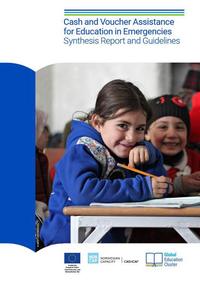Resources
Request support on coordination, information management, capacity development or other education in emergencies areas.
Demande de soutien en coordination, gestion de l’information, développement des capacités et autres domaines de l'éducation en situation d'urgence.
لطلب الدعم في مجال التنسيق ، إدارة المعلومات ، تنمية القدرات أو في اي مجال من مجالات التعليم في مناطق الطوارئ
Solicitar apoyo en coordinación, gestión de la información, desarrollo de capacidades u otra áreas en educación en emergencias.
Featured Resources
below you can find selected tools

COVID-19 Resources
View resources to support education in emergencies coordination during the COVID-19 pandemic.

Guidance on Education Cluster Co-Leadership Arrangements at the Country Level
Indicative Guidance for the establishment and management of co-leadership arrangements at the country level.

Inter-agency Network for Education in Emergencies
For technical education in emergencies resources, please visit the INEE website.
- Coordination: Coordination
- HPC: Strategic Planning
- Technical Areas: Cash Programming
Cash and Voucher Assistance for Education in Emergencies Synthesis Report and Guidelines
The Synthesis Report documents current CVA practices being used to achieve EiE outcomes while the associated guidelines, organized around the Humanitarian Programme Cycle, identify recommendations for education practitioners in order to more systematically consider CVA in response planning
- Coordination: Coordination
- Technical Areas: Cash Programming
Elevating Education in Emergencies: Making Cash Transfer Work Framing Paper
The second instalment in the Elevating Education in Emergencies series takes stock of the work done within the education sector to implement cash transfer programming (CTP) and reflects upon the challenges, successes and opportunities for the future, with a focus on Iraq and Somalia.
- Coordination: Coordination
- HPC: Implementation & Monitoring, Strategic Planning
- Technical Areas: Cash Programming
People-Centred Approaches in Humanitarian Coordination: Reviewing and Improving Cluster Performance
This matrix and accompanying presentation and facilitation notes can be used to help national clusters to review and assess their performance and prioritise actions to ensure people are at the centre of the cluster's work. The matrix uses the Core Cluster Performance Management (CCPM) survey as the…
- Coordination: Coordination, Cluster Strategy
- HPC: Strategic Planning
- Technical Areas: Accountability to Affected Populaiton
Accountability to Affected Populations Checklist
This checklist provides guidance for integrating accountability to affected populations throughout the Cluster Strategy document and development process. It follows the same step-by-step structure as the full Guide to Developing Education Cluster Strategies Available in the Strategy Package.
- Coordination: Coordination, Cluster Strategy
- HPC: Strategic Planning
- Technical Areas: Accountability to Affected Populaiton
Reference Module for the Implementation of the Humanitarian Programme Cycle
The IASC Reference Module for the Implementation of the Humanitarian Program Cycle defines the roles and responsibilities of international humanitarian actors and the way that they interact with each other, national and local authorities, civil society and with people affected by crises. This…
- Coordination: Coordination
- HPC: Implementation & Monitoring, Needs Assessment & Analysis, Operational Peer Review and Evaluation, Resource Mobilisation, Strategic Planning
- Technical Areas: Accountability to Affected Populaiton
MODULE DE RÉFÉRENCE DE L’IASC POUR LA MISE EN ŒUVRE DU CYCLE DE PROGRAMME HUMANITAIRE
The IASC Reference Module for the Implementation of the Humanitarian Program Cycle defines the roles and responsibilities of international humanitarian actors and the way that they interact with each other, national and local authorities, civil society and with people affected by crises. This…
- Coordination: Coordination, Cluster Strategy, Needs Assessment, Information Management
- HPC: Implementation & Monitoring, Needs Assessment & Analysis, Operational Peer Review and Evaluation, Resource Mobilisation, Strategic Planning
- Technical Areas: Accountability to Affected Populaiton
Guidance on Cluster Leadership for Save the Children Country Offices: The Benefits, the Role and the Responsibilities
As a Cluster Lead Agency (CLA), Save the Children is inherently responsible for the effective establishment, management and sustained global and national support of the Education Cluster. The following document outlines the benefits to SC as well as the responsibilities of the Country Director (CD…
- Coordination: Coordination, Cluster Management, Leadership
- HPC: Implementation & Monitoring, Needs Assessment & Analysis, Operational Peer Review and Evaluation, Resource Mobilisation, Strategic Planning
- Technical Areas: Accountability to Affected Populaiton
Cluster Coordination Guidance for Country Offices
This document has been developed to assist UNICEF country offices to better fulfil CLA responsibilities in level 3 (L3) and other emergencies, with reference to relevant IASC protocols and guidance and relevant internal UNICEF reviews and evaluations.9 This document should be used in conjunction…
- Coordination: Coordination, Leadership
- HPC: Implementation & Monitoring, Needs Assessment & Analysis, Operational Peer Review and Evaluation, Resource Mobilisation, Strategic Planning
- Technical Areas: Accountability to Affected Populaiton
Participatory Approaches
Using participatory approaches in impact evaluationmeans involving stakeholders, particularly the participants in a programme or those affected by a given policy, in specific aspects of the evaluation process. The term covers a wide range of different types of participation, which differ in terms…
- Coordination: Coordination, Needs Assessment
- HPC: Needs Assessment & Analysis
- Technical Areas: Accountability to Affected Populaiton
Filter results
Coordination(selected )
Country(selected )
Emergency(selected )
Humanitarian Programme Cycle(selected )
Language(selected )
Publication Date(selected )
Publisher(selected )
Resource Type(selected )
Technical Areas(selected )
Can’t find what you’re looking for?
Contact your relevant language Help Desk









